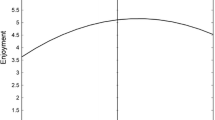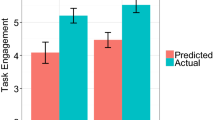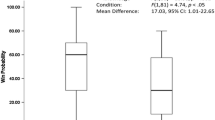Abstract
We explored the effects on intrinsic motivation and ego-involved persistence of winning versus losing a competitively contingent reward and, for losers, the additional effects of receiving either positive performance feedback or performance-contingent rewards. Winners were more intrinsically motivated than losers. Losers given an explicit normative standard who received positive feedback for meeting the standard were more intrinsically motivated than losers who did not receive the additional standard and feedback. Losers who received a performance-contingent reward for reaching the same explicit standard displayed less intrinsic motivation behaviorally assessed than did losers who got positive feedback, but the two groups did not differ on self-reported enjoyment. Effects on enjoyment were mediated by perceived competence, but effects on free-choice behavior were not. People who lost the competition showed more ego-involved persistence than people who won or did not compete.
Similar content being viewed by others
REFERENCES
Butler, R. (1989). Interest in the task and interest in peers' work in competitive and noncompetitive conditions: A developmental study. Child Development, 60, 562–570.
Deci, E. L. (1971). Effects of externally mediated rewards on intrinsic motivation. Journal of Personality and Social Psychology, 18, 105–115.
Deci, E. L., Betley, G., Kahle, J., Abrams, L., & Porac, J. (1981). When trying to win: Competition and intrinsic motivation. Personality and Social Psychology Bulletin, 7, 79–83.
Deci, E. L., Koestner, R., & Ryan, R. M. (1999). A meta-analytic review of experiments examining the effects of extrinsic rewards on intrinsic motivation. Psychological Bulletin, 125, 627–668.
Deci, E. L., & Ryan, R. M. (2000). The “what” and “why” of goal pursuits: Human needs and the self-determination of behavior. Psychological Inquiry, 11, 227–268.
Epstein, J. A., & Harackiewicz, J. M. (1992). Winning is not enough: The effects of competition and achievement orientation on intrinsic interest. Personality and Social Psychology Bulletin, 18, 128–138.
Fisher, C. D. (1978). The effects of personal control, competence, and extrinsic reward systems on intrinsic motivation. Organizational Behavior and Human Performance, 21, 273–288.
Frederick, C. M., & Ryan, R. M. (1995). Self-determination in sport: A review using cognitive evaluation theory. International Journal of Sport Psychology, 26, 5–23.
Harackiewicz, J. M., & Sansone, C. (2000). Rewarding competence: The importance of goals in the study of intrinsic motivation. In C. Sansone & J. M. Harackiewicz (Eds.), Intrinsic and extrinsic motivation: The search for optimal motivation and performance (pp. 79–103). San Diego, CA: Academic Press.
Judd, C. M., & Kenney, D. (1981). Estimating the effects of social interventions. Cambridge, UK: Cambridge University Press.
McAuley, E., & Tammen, V. V. (1989). The effects of subjective and objective competitive outcomes on intrinsic motivation. Journal of Sport and Exercise Psychology, 11, 84–93.
Pritchard, R. D., Campbell, K. M., & Campbell, D. J. (1977). Effects of extrinsic financial rewards on intrinsic motivation. Journal of Applied Psychology, 62, 9–15.
Reeve, J., & Deci, E. L. (1996). Elements within the competitive situation that affect intrinsic motivation. Personality and Social Psychology Bulletin, 22, 24–33.
Reeve, J., Olson, B. C., & Cole, S. G. (1985). Motivation and performance: Two consequences of winning and losing a competition. Motivation and Emotion, 9, 291–298.
Ryan, R. M. (1982). Control and information in the intrapersonal sphere: An extension of cognitive evaluation theory. Journal of Personality and Social Psychology, 43, 450–461.
Ryan, R. M., Koestner, R., & Deci, E. L. (1991). Varied forms of persistence: When free-choice behavior is not intrinsically motivated. Motivation and Emotion, 15, 185–205.
Ryan, R. M., Mims, V., & Koestner, R. (1983). Relation of reward contingency and interpersonal context to intrinsic motivation: A review and test using cognitive evaluation theory. Journal of Personality and Social Psychology, 45, 736–750.
Tauer, J. M., & Harackiewicz, J. M. (1999). Winning isn't enough: Competition, achievement orientation, and intrinsic motivation. Journal of Experimental Social Psychology, 35, 209–235.
Vallerand, R. J., Gauvin, L. I., & Halliwell, W. R. (1986). Negative effects of competition on children's intrinsic motivation. Journal of Social Psychology, 126, 649–657.
Vallerand, R. J., & Reid, G. (1984). On the causal effects of perceived competence on intrinsic motivation: A test of cognitive evaluation theory. Journal of Sport Psychology, 6, 94–102.
Author information
Authors and Affiliations
Corresponding author
Rights and permissions
About this article
Cite this article
Vansteenkiste, M., Deci, E.L. Competitively Contingent Rewards and Intrinsic Motivation: Can Losers Remain Motivated?. Motivation and Emotion 27, 273–299 (2003). https://doi.org/10.1023/A:1026259005264
Issue Date:
DOI: https://doi.org/10.1023/A:1026259005264




